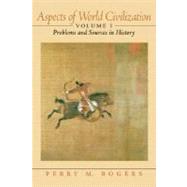
Note: Supplemental materials are not guaranteed with Rental or Used book purchases.
Purchase Benefits
What is included with this book?
| VOLUME I The Ancient World through the Early Modern Era | |||||
| Part I The Foundations of Civilization | 1 | (84) | |||
|
3 | (26) | |||
|
29 | (56) | |||
| Part II The Ancient World (500 B.C.E.-500 C.E.) | 85 | (102) | |||
|
87 | (45) | |||
|
132 | (37) | |||
|
169 | (18) | |||
| Part III The Consolidation of Civilization (500-1450) | 187 | (122) | |||
|
189 | (49) | |||
|
238 | (16) | |||
|
254 | (28) | |||
|
282 | (27) | |||
| Part IV Transitions to the Modern World (1450-1650) | 309 | (2) | |||
|
311 | (41) | |||
|
352 | (47) | |||
|
399 | ||||
| HISTORICAL INTERSECTIONS | |||||
|
34 | (67) | |||
|
101 | (56) | |||
|
|||||
|
157 | (16) | |||
|
|||||
|
173 | (38) | |||
|
211 | (35) | |||
|
|||||
|
246 | (75) | |||
|
|||||
|
321 | (20) | |||
|
|||||
|
341 | (28) | |||
|
|||||
|
369 | ||||
|
|||||
| VOLUME II The Early Modern Era Through the Contemporary World | |||||
| Part I Foundations of the Modern World (1600-1850) | 1 | (130) | |||
|
3 | (30) | |||
|
33 | (53) | |||
|
86 | (23) | |||
|
109 | (22) | |||
| Part II The Age of Imperialism (1840-1900) | 131 | (60) | |||
|
133 | (37) | |||
|
170 | (21) | |||
| Part III The Age of Anxiety (1900-1945) | 191 | (90) | |||
|
193 | (48) | |||
|
241 | (40) | |||
| Part IV New Departures and the Emerging World of the Twenty-First Century (1945-2000) | 281 | (2) | |||
|
283 | (35) | |||
|
318 | (49) | |||
|
367 | ||||
| HISTORICAL INTERSECTIONS | |||||
|
74 | (4) | |||
|
|||||
|
78 | (27) | |||
|
|||||
|
105 | (38) | |||
|
|||||
|
143 | (15) | |||
|
|||||
|
158 | (65) | |||
|
223 | (37) | |||
|
260 | (10) | |||
|
270 | (70) | |||
|
340 | (57) | |||
|
|||||
|
397 | ||||
|
The New copy of this book will include any supplemental materials advertised. Please check the title of the book to determine if it should include any access cards, study guides, lab manuals, CDs, etc.
The Used, Rental and eBook copies of this book are not guaranteed to include any supplemental materials. Typically, only the book itself is included. This is true even if the title states it includes any access cards, study guides, lab manuals, CDs, etc.